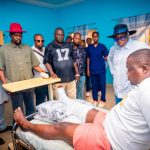With the fatalities from COVID-19 rising by the day, the Federal Government says it is aiming to reduce the mortality rate to one percent just as he warned that the virus would spread more to rural areas across the country.
The Minister of Health, Dr Osagie Ehanire, said at Monday’s briefing of the Presidential Task Force (PTF) on COVID-19 in Abuja that Nigerians should be ready for the pandemic as the nation prepares to reopen its economy fully.
“Our objective is to reduce case fatalities to less than 1% from present 2%, and we are working on innovative interventions with prospects of improving survival chances, especially for the elderly and those with co-morbidities.
“We will work with State governments to prepare necessary space and human resources at General hospitals or PHCs, to be trained for setting up at least one sample collection site at every LGA in due course, with efficient sample retrieval logistics to convey samples to laboratories.
“For patients with significant clinical symptoms, we also plan the designation of holding rooms at General hospitals, with facilities for oxygen administration, such as oxygen concentrators or from oxygen cylinders. Some investment in this strategy, known in Lagos State as oxygen kiosks, will be required, but the benefit, in lives saved, will be significant.
“All this may sound ambitious, but we must face the stark reality that covid-19 will also spread to small towns and rural areas, and so begin to prepare structures to respond to the challenge,’’ the minister said.
Ehanire added: “COVID-19 will also spread more to rural areas, and we should be ready for that. It is too early to read meanings to the COVID-19 data in Nigeria.
“The testing for COVID-19 increased by 40, 000 between June and July. Our health workers should not be apprehensive over PPE as the country has a reasonable stock.
“As the course of the disease becomes clearer, experts are hazarding cautious guesses. The Director General of WHO has warned, for example, that COVID-19 could be with us for a long time. This means we are to consider adjusting to what has been described as the `new normal’ a way of life that is intended to reduce risk of infection, while allowing meaningful economic life to resume and citizens to restore their livelihoods.
“There will be increase in travels, human interactions, gatherings. In all of these, we must not forget our safety and the measures to protect ourselves and our families.”
According to hum, testing for COVID-19 increased by 40, 000 between June and July.
He said that as at Monday, the country recorded 43,841 confirmed cases out of a total of 286,091 samples tested so far, while 20,308 persons have been treated and discharged. He 888 persons have sadly been lost as a result of the COVID-19.
The minister said in comparison, the total number of positive covid-19 cases recorded in July was 17,457, out of a total of 154, 454 samples tested, with a positivity rate of 11.3%, as against the June 2020 figures of 19,149 positive cases from a total of 111,052 samples tested with a positivity rate of 17.2%.
“Although it is far too early to draw conclusions, it is noteworthy that testing increased by over 40,000 in one month and the number of positive cases dropped by more than 2,000.
“ But we must rest on our oars: it is just suggestive of the fact that our strategy is not failing, and we must continue to sustain efforts.”
























Leave a comment